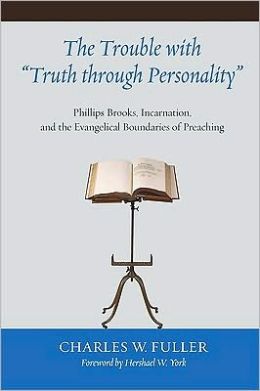Charles W. Fuller: The Trouble with “Truth through Personality”
 Charles W. Fuller, The Trouble with “Truth through Personality”: Phillip Brooks, Incarnation, and the Evangelical Boundaries of Preaching (Eugene, Ore.: Wipf & Stock, 2010), 137 pages, ISBN 9781608994038.
Charles W. Fuller, The Trouble with “Truth through Personality”: Phillip Brooks, Incarnation, and the Evangelical Boundaries of Preaching (Eugene, Ore.: Wipf & Stock, 2010), 137 pages, ISBN 9781608994038.
‘Preaching is the bringing of truth through personality,’ stated Phillips Brooks, the former rector of Trinity Church in Boston and later Episcopal bishop of Massachusetts who lived from 1835 to 1893, to the original listeners of his now famous lectures on preaching at Yale College.[1] Many preachers and homileticians have quoted his definition ever since. But what does it actually mean? Charles W. Fuller, pastor of Bethany Baptist Church in Louisville, Kentucky and adjunct professor of Expository Preaching at Boyce College of The Southern Baptist Theological Seminary, examines Brooks’ sermons, lectures, and writings in an attempt to find out exactly.
The author forthrightly states the main thesis of his book in its introduction: “This book assesses, from an evangelical perspective, Brooks’s [sic] classic definition of preaching as ‘truth through personality’ and, after pinpointing its substantial weaknesses, salvages the concept by reconstructing it with solidly evangelical doctrines (p. xviii).
Though Fuller claims to write as an evangelical, the non-Calvinistic reader soon begins to wonder with what form of evangelicalism does the author identify himself? Since he serves as an adjunct professor Boyce College of The Southern Baptist Theological Seminary, it seems safe to assume he alludes to those Calvinistic evangelicals who consider themselves the only true proclaimers of the pure unadulterated gospel of Jesus Christ. The Southern Baptist Seminary has become known in recent years as a bastion of high or five-point Calvinism. Since Brooks tended to lean away from high Calvinism, even to the point of questioning the teaching of what is now known as eternal security (a distinctive doctrine of the church Fuller pastors), this reviewer wonders if this is the reason Fuller accuses Brooks of unorthodoxy?
Over all, the book tends to be blatantly negative of Brooks, as the author frankly admits and laments. A major concern for Fuller is his belief that Brooks emphasized the importance of personality over truth. He alleges Brooks did so because of his less than evangelical theology, the influence of the teaching of evolution and higher criticism in his day, and his wide reading of philosophic Romantic literature. He especially takes exception to what he perceives as Brooks’ emphasis on Jesus’ example over His atonement.
Fuller contends three problems confront any academic study of Brooks: his popularity, his ambiguity, and his idealism (pp. xxi-xxii). Brooks was an immensely popular preacher in his day. By his own admission, Brooks felt he was at his best when he spoke in general rather than in specific terms.[2] And Brooks was a product of Romanticism to some extent with its emphasis on feelings over the facts of faith. But Fuller makes Brooks into more or less a liberal in his day. He does so by evaluating Brooks’ theology in four areas: biblicism, crucicentrism, conversionism, and activism (to use Fuller’s own categories). He finds Brooks deficient on every evangelical scale he proposes. He never seems to give Brooks the benefit of the doubt. He apparently finds little, if anything, to admire in the man or his ministry, although many people in Brooks’ own day felt decidedly positive toward him.
For instance, Fuller often quotes what appear to be clear affirmations of evangelical theology by Brooks only to turn right around and explain them away. This unusual methodology gives the impression Brooks could not do or say anything right in the mind of Fuller.
Category: In Depth
About the Author: Steve D. Eutsler, D.Min. (Assemblies of God Theological Seminary), M.Div. (Assemblies of God Theological Seminary), M.A. Biblical Literature (Assemblies of God Theological Seminary), B.A. Bible (Central Bible College), is professor of Bible and Practical Theology at Global University in Springfield, Missouri. He has extensive experience as a pastor, evangelist, and educator and is the author of numerous articles and books. www.wix.com/SteveEutsler/reveut Email


